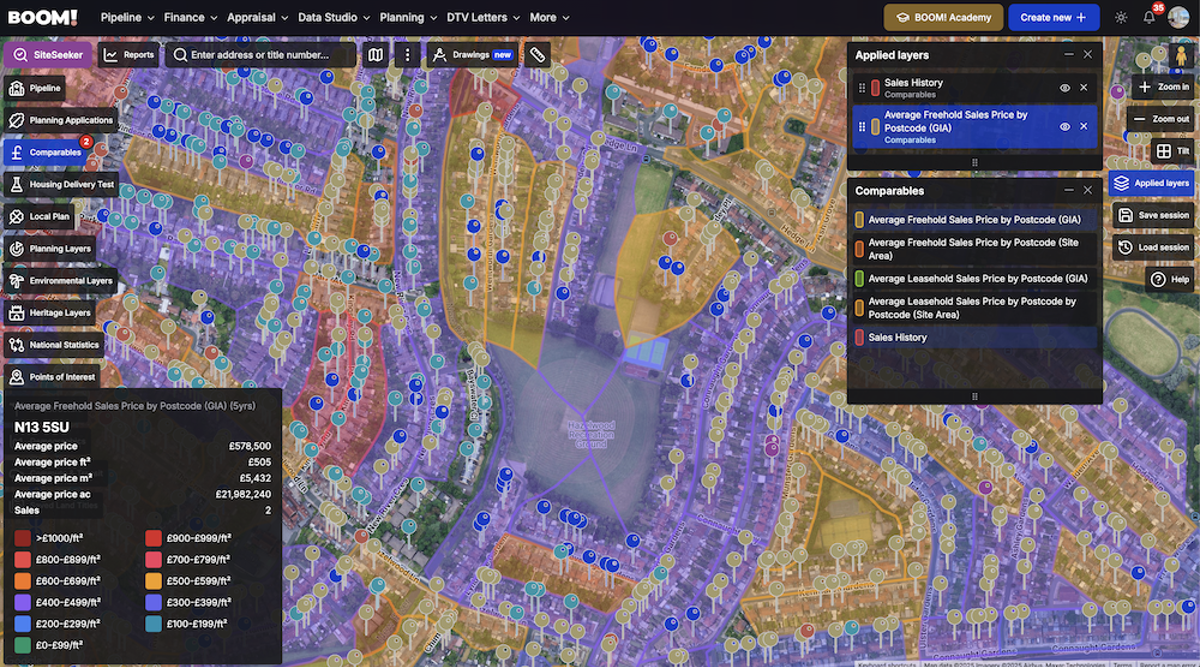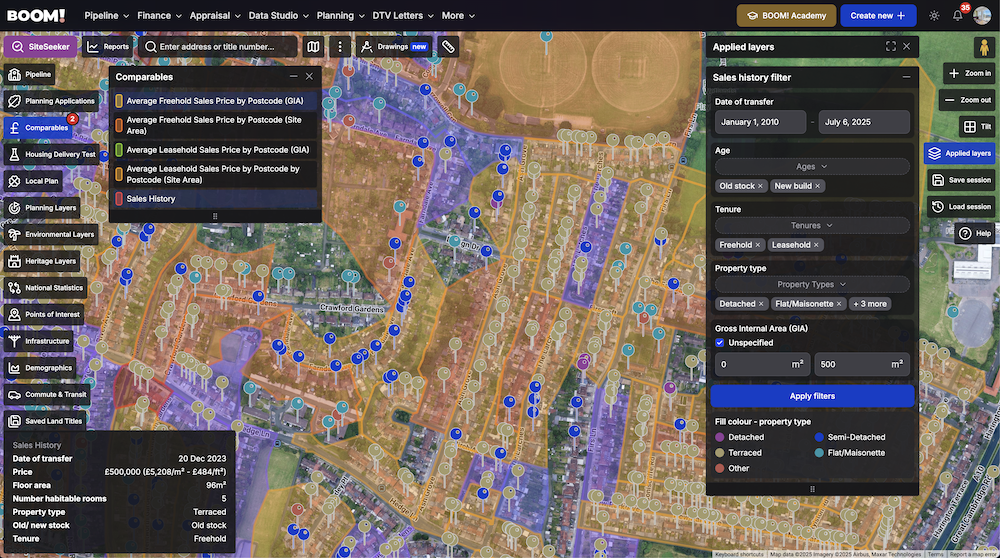UK Land Registry Sold Prices: The Secret Weapon for Smarter Property Deals in 2025







Ever wondered how some developers always snag the best property deals? It’s not luck or a crystal ball – they’re tapping into a little-known data goldmine. In the UK, every property sale gets logged with an official price. This isn’t the asking price you see in listings, but the actual figure a buyer paid. Welcome to UK Land Registry sold prices – a resource so powerful that missing out on it could cost you thousands.
Curious? You should be. Using this data, you can instantly check what homes and land sold for in any area. That means no more guesswork or blindly trusting estate agent hype. And while big-shot investors have quietly used it for years, today we’ll show you how to leverage this insider info for your own property success. Time is money in real estate – so let’s dive in and make sure you’re not left behind.
What Are UK Land Registry Sold Prices?
Land Registry sold prices are the official record of property sale values. Whenever a house or plot sells in England or Wales, it gets registered with HM Land Registry, including details like:
Address and Postcode – the exact location of the property.
Sale Price and Date – how much it sold for and when.
Property Details – type of property (detached, flat, etc.), whether it was new or existing, and its tenure (freehold or leasehold).
These records are updated monthly and reflect final sold prices – not inflated asking prices or estimates. In fact, Land Registry has captured over 20 million sales since 1995, making it one of the most comprehensive property databases available. This is real, hard data direct from the government, not hearsay.
Why does that matter? For one, it’s highly credible. Major property websites like Rightmove and Zoopla pull their sold house price info straight from Land Registry. HM Land Registry registers over 100,000 home sales each month, so if you want to know what properties actually sold for (not just what sellers hoped for), this is the source. It’s like having the truth serum of the property market at your fingertips.
Why Land Registry Sold Prices Are a Game-Changer
Using sold price data isn’t just interesting trivia – it’s a competitive edge. Here’s how it can give you an advantage (especially if you’re a new developer or deal sourcer):
Know the Real Market Value: Forget guesswork. Sold prices show you what buyers paid in your target area or street. This helps you spot if a seller’s asking price is way off. You’ll avoid overpaying or walking away from a bargain. Knowledge = negotiating power. When you see that three similar plots on the same street sold for £200k but one owner wants £250k, you’ll know it’s overpriced – and you can prove it.
Spot Hidden Opportunities: The data can reveal undervalued areas or up-and-coming hotspots before everyone else catches on. For example, some exclusive London postcodes see sale prices over £20,000 per square metre, while parts of Grimsby or Rhondda are under £1,000 per m². That huge gap screams opportunity. Maybe a nearby town has low prices now but strong growth potential – sold stats will show you the trend. By tracking prices by postcode, you can find the “cheap” locations next to expensive neighborhoods that developers often target for the next big jump.
Invest with Confidence: Data equals confidence. When you have hard facts on your side, you can move fast on deals. Planning a new build or flip? Check what similar homes sold for recently to forecast your resale value. Doing this homework means fewer surprises – you’ll enter each deal with eyes wide open. In short, sold prices are proof. They replace “I think this area is worth X” with “I know properties here sold for X on average last year.” That confidence not only helps you invest smarter, it also impresses lenders and partners because you can back up your projections with evidence.
Time the Market: The property market isn’t static – prices can rise or fall each year. Land Registry data lets you see those trends in real time. If you notice prices in a suburb are creeping up every quarter, that might urge you to act fast and buy before you’re priced out. Conversely, if prices are dipping, you can negotiate harder or wait for an even better deal. Remember, waiting just a year could mean paying an extra £10,000 if the average house price jumps (as it did from 2023 to 2024). Sold prices arm you with facts to decide when to strike, so you’re not relying on rumors or media doom-and-gloom.
How to Check UK Sold Prices (and Get Ahead)

Getting hold of Land Registry sold price data is easier than you might think:
All-in-One PropTech Platforms: If you’re serious about sourcing multiple deals or analysing areas in depth, this is the insider shortcut. BOOM (our property development SaaS platform) has all the Land Registry sold price data built in – and then some. We aggregate prices for each postcode, so you can view average sale prices and trends on a map instead of combing through spreadsheets. You can filter by property type, date range, and more in a few clicks. In practice, that means instead of manually checking 20 addresses around a site you’re eyeing, you can pull up a quick report on BOOM and see immediately what homes are selling for in that postcode and neighboring ones. It’s like having a property data analyst on demand, showing you where the deals are. No more flying blind or wasting time – you get the full picture at a glance. (And yes, it’s all using the same trusted Land Registry figures, just supercharged for speed and ease.)
Official Land Registry Search: The government provides a free online tool where you can search sold house prices by address or postcode. It shows historical sales all the way back to 1995. This is great for a quick lookup of a specific property or street. (For example, want to know what 10 Downing Street last sold for? You can find out in seconds!) You can even download bulk datasets of all sales if you’re a data geek. The downside: the official site gives raw info without much analysis, and you have to search one area at a time.
Property Portals: Websites like Rightmove and Zoopla have a “sold prices” section where you can see past sale prices in a given area. These are user-friendly and often show photos or old listings too. It’s handy for casual research – say you’re curious what the house next door sold for last year. Just remember, it’s the same Land Registry data underneath, and you’ll still be checking one property or street at a time.
Unlock Your Next Deal with Data
Here’s the bottom line: knowledge is power in property development. UK Land Registry sold prices give you that knowledge in black and white. What you do with it can be the difference between snagging a profitable deal or overpaying by £50,000 and regretting it. The data is out there, updated every month, covering virtually every sale in the country – an open secret waiting for you to take advantage.
The best part? Anyone can access this information and use it to make better decisions. Many newcomers hesitate, sticking to “gut feeling” or following the crowd. Not you – not anymore. You now know where to verify the true value of any property and how to uncover trends that others miss. Every successful developer or land sourcer you admire is likely doing the same homework behind the scenes.
So don’t wait. The property market moves quickly, and great opportunities won’t sit around. Start checking sold prices for areas you’re interested in today – whether through the official registry or a platform like BOOM that puts it all at your fingertips. Fuel your curiosity. See what prices are doing in that town you’ve been eyeing or how that “bargain” listing actually compares to recent sales. You’ll be amazed at the insights you gain.
In 2025 and beyond, data-driven deal makers will leave the amateurs in the dust. By using Land Registry sold prices, you’re effectively getting inside information – legally and for free – on the most important number in property: the price. Empower yourself with this data, and turn that knowledge into profit. Your future self (and your bank account) will thank you for it.
To better understand how you can leverage Land Registry Sold Prices sign up for a 7 day FREE trial or book a call with us and let us show you.